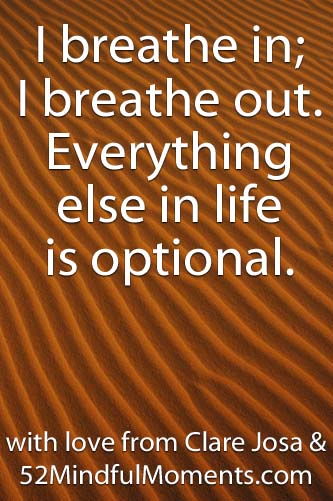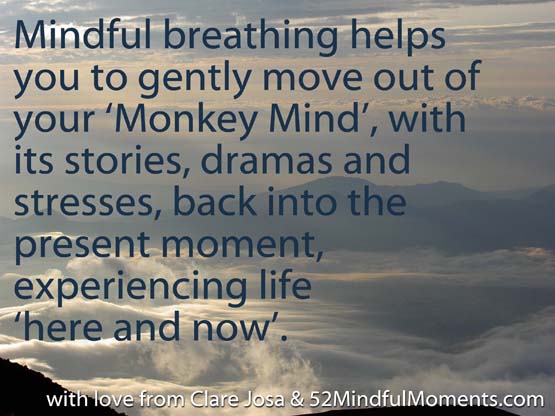 Hi %%FIRST_NAME%%,
Hi %%FIRST_NAME%%,
Welcome to Week 16!
How did you get on with your Mindful Minutes last week?
![]() I’d love to hear how you got on with this – here’s where you can share, over at the forum. When you’re ready to feed back on this, here’s the link:
I’d love to hear how you got on with this – here’s where you can share, over at the forum. When you’re ready to feed back on this, here’s the link:
One mindful minute.
This week we’re moving on to deeper-acting mindfulness techniques.
So far in 52 Mindful Moments, we have been concentrating on practical present-moment de-stressing techniques. Today I’d like to move on to help you create a more meditative state of mind, to help you move towards living from a place of inner peace, rather than stress and worry. I hope that’s ok with you.
This week we’re moving onto breath awareness.
We rarely notice that we’re breathing, unless it’s causing a problem for us. Yet your breath can hold the key to calming your mind and feeling more at peace, when you know how.
In meditation, the area of breath awareness and breath control is called pranayama – an ancient Sanskrit word that connects our breath to our life force. The power of our breath to impact our consciousness, emotional and mental states and even physical well-being and spiritual development has been understood by meditators for thousands of years. It’s an enormous field of study and we won’t be doing much of it here in 52 Mindful Moments, but we will be covering the the most important technique to allow you to start working with your breath: breath awareness and acceptance.
As with everything in mindfulness, it all starts with those two aspects of life:
- Awareness
- Acceptance
If you’re not aware of what’s happening in the present moment, then you’re not ‘here’ – you’re in a re-lived past or an imaginary future.
If you bring your awareness back to the present moment, you can choose to accept the Truth of what you are experiencing, which will bring you peace.
Full breath awareness, often called ‘mindful breathing’, is one of the foundation techniques for learning mindfulness meditation.
It is something you can do wherever you are, whatever is going on around you, and no one will notice.
It also has the potential to transform your experience of life. And it’s free.
Not bad for such a simple idea?
Mindful breathing helps you to gently move out of your ‘Monkey Mind’, with its stories, dramas and stresses, back into the present moment, experiencing life ‘here and now’.
 By becoming aware of your breathing, you are helping yourself to:
By becoming aware of your breathing, you are helping yourself to:
- Learn how to concentrate – it’s amazing how your mind can wander, even with such a supposedly simple task. It’s great brain training.
- Calm and slow your mind, as it switches from multi-tasking to a few moments of just concentrating on one thing.
- Rebalance your body’s stress hormones – as your focus on your breathing, and only your breathing, gives your body the signal to stop flooding your system with adrenalin and other stress hormones, allowing your body’s relaxation response to come back into play.
This technique is a wonderful de-stressing tool, as well as being useful mindfulness practice. The benefits are huge. Want to give it a go?
Mindful Breathing
- Stop whatever you are doing and take a deep breath in to your belly, just above your belly button. Breathe out with an ‘ahhhh’ sound, as you relax your body and mind (you can make this silent!). Do this 3 times.
- Now allow your breathing to settle into a natural, comfortable rhythm.
- Bring all of your focus to your breathing. Allow your mind to rest, watching, listening to and feeling the physical sensations of your breath.
- If your Monkey Mind needs a job, as you breathe in, you might like to mentally say, “I breathe in.”
- As you breathe out, you might like to mentally say, “I breathe out.”
- If you are feeling particularly stressed, you might choose phrases such as “I breathe in relaxation; I breathe out stress and worry.”
- If your mind wanders, that’s ok. Gently bring it back to following your breath.
- Repeat this for at least a minute. Do it in a relaxed way, with a gentle smile on your face.
You might find it easier to concentrate if you close your eyes.
Even if you’re not feeling stressed, you can still benefit hugely from regular practise of mindful breathing throughout your day. It can help you move into the present moment much more easily. And the more you practise it, the easier it gets. It has a subtle, profound impact on all aspects of your experience of life.

How did you find your mindful breathing?
Did your Monkey Mind join in? Or did it play games?
Any insights? Any questions?
I’d love to hear how you’re getting on with 52 Mindful Moments, over at the forum.
That’s all for this week.
I hope you’re enjoying this course so far.
I’ll be back next week with a technique that builds on this week’s mindful breathing, but which helps you bring you awareness even more strongly into your body – with a smile on your face!
Namaste,
![]()
